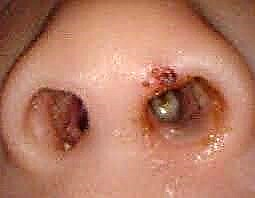Everyone has their own way of treating alternative medicine. Some consider it ineffective, others - a panacea for all diseases. Truth is in the middle. As with traditional medicine, there is no perfect remedy, but when applied in an integrated manner, alternative remedies are quite effective.
The cough is very exhausting and exhausting. Especially when, instead of sleeping, the child coughs all night, does not get enough sleep and does not get well, and the exhausted mother does not know how to help, and calls the doctor at home again. Quite often, doctors prescribe Stodal syrup. Let's carefully read the instructions and find out what this drug is.
What is Homeopathy?

There are two main approaches in homeopathy:
- Classic, in which one substance is used, and the doctor calculates the dilution dose of the substance (not only herbs, but also poisons).
- Complex homeopathy. This is a kind of "universal formula". In one bottle, complementary substances are mixed (for example, herbs for coughs) and diluted in one constant concentration.
However, even homeopaths themselves recognize complex remedies as less effective, since everyone's disease proceeds in a special way, the reactivity of each organism is also individual. Sometimes taking complex drugs does not bring the expected effect.
Despite the fact that homeopathy is opposed to the principles of classical pharmacology, the use of both homeopathic and pharmacological medicines is not excluded.
Unlike the medicines presented by classical medicine, homeopathic medicines have never been tested for safety, and no side effects have been identified from the use of these substances.
Diet when using homeopathic remedies is an important nuance. It is believed that when taking homeopathic medicines, it is recommended to exclude mint, as it can be an antagonist of many homeopathic medicines. It is also recommended to exclude coffee.
A cough stop for children. Instructions for use
Stodal is a multi-ingredient cough syrup. It is produced in dark bottles and has a sweet - sugary taste. Since the drug is homeopathic, it is believed that it can be used in adults, children and during pregnancy. Is syrup for everyone?
In the official instructions, there is neither a scheme for prescribing the drug, nor exact instructions from what age it can be prescribed.
Children under one year old
 The drug contains ethyl alcohol, which means that the appointment of the drug to young children is undesirable.
The drug contains ethyl alcohol, which means that the appointment of the drug to young children is undesirable.
But the official instructions say cleverly: give children 5 ml with a measuring cap 3 - 5 times a day. The duration of use must be agreed with your doctor.
Reception during pregnancy and lactation
It must be remembered that ethanol easily crosses the placental barrier and enters the baby's bloodstream. It has been proven that ethyl alcohol causes congenital malformations in fetuses. Ethanol is also excreted in milk. In what concentrations alcohol enters the child's body, neither the first nor the second case is known. Thus, in these situations, I would advise you to refuse admission.
However, in the official instructions it is written briefly - a doctor's consultation is necessary.
For adults, the drug is recommended 15 ml 3 - 5 times a day.
Composition of the preparation
- Pulsatilla (sleep-herb) has anti-inflammatory effects, reduces the urge to cough.
- Rumex crispus (curly sorrel). Also has anti-inflammatory effects.
- Bryonia (white cross) is a poisonous plant, is a pain reliever, reduces the viscosity of phlegm.
- Ipeca (vomit root) is a plant used in small doses for coughs.
- Spongia tosta (burnt sea sponge) is used for hoarseness, reduces bronchospasm.
- Sticta pulmonaria (lichen) treats ear and throat ailments, relieves inflammation.
- Antimonium tartaricum (emetic) is used for a convulsive cough, for the discharge of mucus.
- Myocarde is a remedy that relieves the passage of phlegm.
- Coccus cacti is used to treat whooping cough and to relieve coughs associated with it.
- Drosera (sundew) is an herb that relieves coughs.
Excipients:
- ethyl alcohol 96%;
- benzoic acid;
- Tolu syrup, Polegala syrup;
- sucrose syrup up to 100 ml.
Knowing the composition of the drug, we conclude that it must be prescribed with caution to people with:
- diabetes mellitus;
- alcohol addiction;
- epilepsy.
Side effects of the drug
The official instructions say that at the moment there is no information on the side effects of the drug. If you experience side effects, you should consult a doctor.
Since there is no data on pharmacokinetics, there are also no data on the effects caused by the drug.

But given the complex herbal composition, an allergic reaction is possible.
Contraindications
- Fructosuria.
- Glucose-galactose malabsorption.
- Allergy.
- Sucrose-isomaltase deficiency.
A very significant advantage of the drug is that it does not cause an overdose.
Indications
Cough of any etiology.
A little about the physiology of cough
Everyone knows that a cough is a special protective reflex that occurs when something foreign gets into the respiratory tract.
At first glance, everything is simple. The respiratory organs are innervated by the vagus nerve. When a foreign agent enters the mucous membrane, the nerve fibers are irritated, the signal goes to the cough center of the brain, where the response of the respiratory muscles is organized.
The coughing mechanism is as follows. First, a person takes a breath, then the glottis closes and a strong exhalation occurs with an increase in intrathoracic pressure, after which the glottis opens and a jerky strong exhalation occurs. This is the mechanism of the so-called reflex cough.
It also happens that a cough is associated with irritation of the central nervous system.
There are 2 types of cough.
- Dry cough - usually occurs with diseases of the trachea, nasopharynx.
- Wet cough - a cough with sputum production associated with bronchial disease.
Thus, for the treatment of cough it is necessary:
- liquefy and remove phlegm, if any;
- reduce bronchospasm;
- reduce inflammation of the upper respiratory tract (with laryngitis, tracheitis, pharyngitis).
The manufacturer indicates in the instructions that the drug copes with these tasks. But after reading reviews of the drug, you can understand that this is not always the case. Probably because the very etiology (cause of cough) is different, and bronchitis caused by Haemophilus influenzae or streptococcus cannot be treated only with a homeopathic medicine.
This drug does not affect the cause of the disease in any way, it only removes the effect. Therefore, be very careful not to stop taking antibiotics or antiviral medications if your doctor has prescribed them.
Analogs
There are many analogues of Stodal. Let's talk about just a few.

- ACC is a pharmacological preparation, it has nothing to do with homeopathy. A mucolytic agent, that is, a sputum-thinning agent. Available in the form of effervescent tablets and powder for preparing a hot drink. It is used with extreme caution during pregnancy.
- Pulmex baby is a combined ointment for children from 6 months to 3 years. Used as an adjuvant in the treatment of bronchitis. It is applied to the skin. Cannot be applied to mucous membranes!
- Bromhexine is a mucolytic agent, available in the form of tablets, pills and mixtures. It is forbidden to receive in the first trimester of pregnancy, then - with caution. Children are prescribed from the age of three.
- Alteika is an expectorant of herbal origin, the drug contains ethyl alcohol, although contraindications during pregnancy are not indicated in the instructions, as in Stodal's instructions.
- Doctor IOM is a drug that expands the lumen of the bronchi. Available as an ointment. Not recommended for pregnant and lactating mothers. Recommended in pediatrics from 3 years
- Ambroxol is a mucolytic drug, but it has one important property - it stimulates the formation of surfactant and can be used not only to treat cough in young children, but also to stimulate the formation of surfactant in premature babies. Method of production: tablets, syrup, solution for inhalation.
- Ambrohexal is a mucolytic and expectorant agent. Approved for admission to young children. Undesirable during pregnancy. If there are no special indications (the threat of premature birth from 28 to 34 weeks), the drug is prescribed to stimulate the production of surfactant in the fetus.
Summing up, I would like to note that the drug has a lot of worthy analogues, tested and approved for use in early childhood.
Using this drug, you do not need to give up complex treatment.



